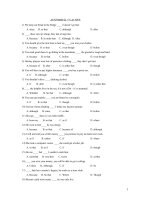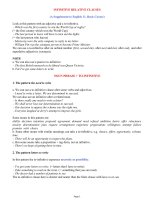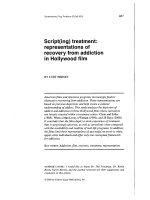ED CLAUSES ING CLAUSES
Bạn đang xem bản rút gọn của tài liệu. Xem và tải ngay bản đầy đủ của tài liệu tại đây (121.17 KB, 1 trang )
-ED CLAUSES & -ING CLAUSES
A. A clause is a part of a sentence. Some clauses begin with -ing or -ed. For example:
- Do you know the woman talking to Tom ?
[-ing clause]
- The boy injured in the accident was
to hospital. [-ed clause]
B. We use -ing clauses to say what somebody (or
something) is (or was) doing at a particular time:
- Do you know the woman talking to Tom? (The
woman is talking to Tom.)
- Police investigating the crime are looking for
three men. (Police are investigating the crime.)
- Who were those people waiting outside? (They were waiting.)
- I was woken up by a bell ringing. (A bell was ringing)
You can also use an -ing clause to say what happens all the time, not just at a particular
time. For example:
- The road connecting the two villages is very narrow. (The road connects the two villages.)
- I have a large room overlooking the garden. (The room overlooks the garden.)
- Can you think of the name of a flower beginning with T? (The name begins with T.)
C. -ed clauses have a passive meaning:
- The boy injured in the accident was taken to hospital.
(He was injured in the accident.)
- George showed me some pictures painted by his father.
(They had been painted by his father.)
'Injured' and 'invited' are past participles. Note that many past participles are irregular
and do not end in -ed (stolen / made / written, etc.):
- The police never found the money stolen in the robbery.
- Most of the goods made in this factory are exported.
You can use 'left' in this way, with the meaning 'not used, still there':
- We've eaten nearly all the chocolates. There are only a few left.
D. We often use -ing and -ed clauses after there is / there was, etc.:
- There were some children swimming in the river.
- Is there anybody waiting?
- There was a big red car parked outside the house.
PRACTICE
I. Make one sentence from two. Complete the sentences with an -ing clause.
1. A bell was ringing. I was woken up by it.
- I was woken up by a bell ringing
2. A man was sitting next to me on the plane. I didn't talk much to him.
I didn't talk much to the.............................
3. A taxi was taking us to the airport. It broke down.
The...............................................broke down.
4. There's a path at the end of this street. The path leads to the river.
At the end of the street there's a .................................................
5. A factory has just opened in the town. lt employs 500 people.
A........................................................has just opened in the town.
6. The company sent me a brochure. lt contained the information I needed.
The company sent me...................................................................
II. Make one sentence from two, beginning as shown. Each time make an -ed
clause.
1. A boy was injured in the accident. He was taken to hospital.
The boy injured in the accident was taken to hospital.
2. A gate was damaged in the storm. lt has now been repaired.
The gate.......................................... has now been repaired.
3. A number of suggestions were made at the meeting. Most of them were not very
practical.
Most of the.................................................were not very practical.
4. Some paintings were stolen from the museum. They haven't been found yet.
The ...............................................................haven't been found yet.
III. Complete the sentences using the following verbs in the correct form:
blow - call - invite - live - offer - read - ring - sit - study - work
1. I was woken up by a bell ringing.
2. Some of the people invited to the party can't come.
3. Life must be very unpleasant for people.......near busy airports.
4. A few days after the interview, I received an email.......me the job.
5. Somebody........ jack phoned while you were out.
6. There was a tree.........down in the storm last night.
7. The waiting room was empty except for a young man.......by the window.......a
magazine.
8. Ian has a brother..........in a bank in London and a sister.........economics at university.
IV. Use the words in brackets to make sentences using There is / There was, etc.
1. That house is empty. (nobody / live / in it) .......................
2. The accident wasn’t serious. (nobody / injure).....................
3. I can hear footsteps. (somebody / come) There.........................
4. The train was full. (a lot of people / travel)
5. We were the only guests at the hotel. (nobody else / stay there)
6. The piece of paper was blank. (nothing / write / on it)
7. The college offers English courses in the evening. (a course / begin / next Monday)
Most of the.........................were not very practical.
8. A man was arrested by the police. What's his name? What's the name of.................









